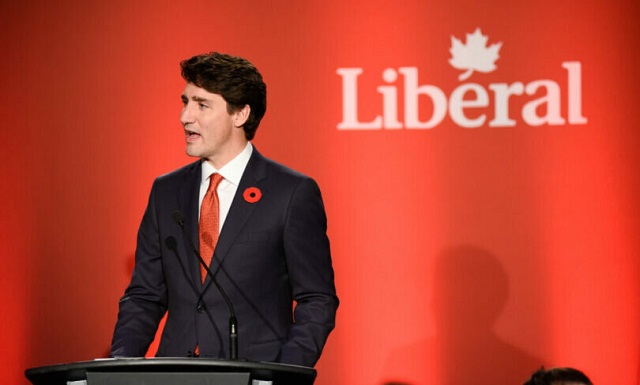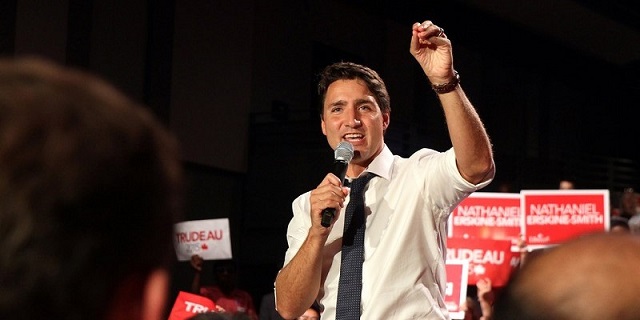National
Official petition to oust Trudeau surpasses 370k signatures

From LifeSiteNews
‘This isn’t just a petition; it’s a battle cry from the heart of Canada, a nation known for its resilience, politeness, and, above all, its love for freedom and democracy,’ wrote Canadian journalist Dan Knight.
Canadians could replace Prime Minister Justin Trudeau this Christmas season as hundreds of thousands call for a no-confidence vote.
December 24, Christmas Eve, marks the closing date for a petition demanding a vote of no confidence and election call against Trudeau and his Liberal government. The appeal has already been signed by 371,169 Canadians across the country as of this writing.
“With just four days left until Christmas, Canadians across the country might be on the cusp of witnessing what could only be described as a political Christmas miracle,” Canadian journalist Dan Knight wrote on X, formerly known as Twitter.
With just four days left until Christmas, Canadians across the country might be on the cusp of witnessing what could only be described as a political Christmas miracle. Spearheaded by MP Michelle Ferreri, petition e-4701, a document symbolizing a national outcry for governmental… pic.twitter.com/U13uOEAOTF
— Dan Knight (@DanKnightMMA) December 21, 2023
“As families gather around festive lights and Christmas trees, a different kind of gathering is taking place – a gathering of voices, hundreds of thousands strong, united in their call for a vote of no confidence against Prime Minister Justin Trudeau,” he continued.
The petition has received overwhelming support by Canadians who are standing up for their freedoms which have been taken away and limited by Trudeau and his government.
“This isn’t just any petition,” Knight added. “It’s a historic movement, the likes of which Canada has never seen before, and its closing date – December 24, 2023 – couldn’t be more symbolic. In a season known for hope, change, and miracles, e-4701 embodies the collective aspiration of Canadians for a shift in their political landscape.”
“This isn’t just a petition; it’s a battle cry from the heart of Canada, a nation known for its resilience, politeness, and, above all, its love for freedom and democracy,” he declared.
The official petition, titled petition e-4701, was initiated by Peterborough, Ontario resident Melissa Outwater and sponsored by Conservative MP Michelle Ferreri.
It reads, “We, the undersigned, citizens and residents of Canada, call upon the House of Commons to call for a vote of no confidence and a federal election 45 days following the vote.”
Petitions to Canada’s House of Commons can be started by anyone but must have the support of five Canadian citizens or residents along with the support of a sitting MP.
Once a petition has more than 500 verified signatures, it is presented to the House of Commons, where it awaits an official government response.
The stipulations the petition lays out for the vote of no confidence to take place reads: “The citizens of Canada have lost confidence in Justin Trudeau and the Liberal/NDP coalition. We call on the house for a vote of no confidence. We ask for an election 45 days after the vote if won.”
The petition stipulates that the current Liberal government under Trudeau is “not acting in the best interest of all citizens” due to its ideologically charged agenda of going after people’s “civil liberties” and “unbalanced immigration policies.”
“The policies of this government aren’t aligning with the crisis Canada is facing: housing costs, infringement of civil liberties, highest inflation in history, unbalanced immigration policies, taxation to the point of poverty, weakening of our economy by importing natural resources that Canada already has and under-utilizes,” it reads.
Additionally, the petition states that after over eight years with Trudeau in charge, Canadians are losing confidence in his leadership, especially “after five ethics investigations” have had to be conducted.
As a result, the petition states that Canada’s “reputation” is “being tarnished on a global scale under his leadership.”
Recent polls show that the Trudeau Liberals’ scandal-plagued government’s popularity has taken a nosedive with no end in sight.
Per a recent LifeSiteNews report, according to polls, were a Canadian federal election held today the Conservatives under leader Pierre Poilievre would win a majority in the House of Commons over Trudeau’s Liberals.
Trudeau’s popularity has been falling and his government has been embroiled in scandal after scandal, the latest being a controversy around a three-year carbon tax “pause” he announced on home heating oil, but only in Atlantic Canadian provinces.
Even top Liberal party stalwarts have called for him to resign.
However, the New Democratic Party (NDP) has an informal coalition with Trudeau that began last year, agreeing to support and keep the Liberals in power until the next election is mandated by law in 2025. Until the NDP decides to break ranks with the Liberals, an early election call is unlikely.
While the petition will close December 24, it will not be presented to Parliament until January 29, 2024. After the petition is presented, Trudeau and his government will have 45 days to respond.
To see the petition to replace Trudeau and his Liberal government, click here.
Economy
Ottawa’s homebuilding plans might discourage much-needed business investment

From the Fraser Institute
In the minds of most Canadians, there’s little connection between housing affordability and productivity growth, a somewhat wonky term used mainly by economists. But in fact, the connection is very real.
To improve affordability, the Trudeau government recently announced various financing programs to encourage more investment in residential housing including $6 billion for the Canada Housing Infrastructure Fund and $15 billion for an apartment construction loan program.
Meanwhile, Carolyn Rogers, senior deputy governor of the Bank of Canada, recently said weak business investment is contributing to Canada’s weak growth in productivity (essentially the value of economic output per hour of work). Therefore, business investment to promote productivity growth and income growth for workers is also an economic priority.
But here’s the problem. There’s only so much financial capital at reasonable interest rates to go around.
Because Canada is a small open economy, it might seem that Canadian investors have unlimited access to offshore financial capital, but this is not true. Foreign lenders and investors incur foreign exchange risk when investing in Canadian-dollar denominated assets, and the risk that Canadian asset values will decline in real value. Suppliers of financial capital expect to receive higher yields on their investments for taking on more risk. Hence, investment in residential housing (which the Trudeau government wants to promote) and investment in business assets (which the Bank of Canada warns is weak) compete against each other for scarce financial capital supplied by both domestic and foreign savers.
For perspective, investment in residential housing as a share of total investment increased from 22.4 per cent in 2000 to 41.3 per cent in 2021. Over the same period, investment in two asset categories critical to improving productivity—information and communications equipment and intellectual property products including computer software—decreased from 30.3 per cent of total domestic investment in 2000 to 22.7 per cent in 2021.
What are the potential solutions?
Of course, more financial capital might be available at existing interest rates for domestic investment in residential housing and productivity-enhancing business assets if investment growth declines in other asset categories such as transportation, roads and hospitals. But these assets also contribute to improved productivity and living standards.
Regulatory and legal pressures on Canadian pension funds to invest more in Canada and less abroad would also free up domestic savings for increased investments in residential housing, machinery and equipment and intellectual property products. But this amounts to an implicit tax on Canadians with domestic pension fund holdings to subsidize other investors.
Alternatively, to increase domestic savings, governments in Canada could increase consumption taxes (e.g. sales taxes) while reducing or even eliminating capital gains taxes, which reduce the after-tax expected returns to investing in businesses, particularly riskier new and emerging domestic companies. (Although according to the recent federal budget, the Trudeau government plans to increase capital gains taxes.)
Or governments could reduce the regulatory burden on private-sector businesses, especially small and medium-sized enterprises, so financial capital and other inputs used to comply with often duplicative or excessive regulation can be used to invest in productivity-enhancing assets. And governments could eliminate restrictions on foreign investment in large parts of the Canadian economy including telecommunications, banking and transportation. By increasing competition, governments can improve productivity.
Eliminating such restrictions would also arguably increase the supply of foreign financial capital flowing into Canada to the extent that large foreign investors would prefer to manage their Canadian assets rather than take portfolio investment positions in Canadian-owned companies.
Canadians would undoubtedly benefit from increases in housing construction (and subsequently, increased affordability) and improved productivity from increased business investment. However, government subsidies to home builders, including the billions recently announced by the Trudeau government, simply move available domestic savings from one set of investments to another. The policy goal should be to increase the availability of risk-taking financial capital so the costs of capital decrease for Canadian investors.
Author:
National
British Columbia quickly shoots down bill to ban men from competing in women’s sports

From LifeSiteNews
‘There are inherent differences between males and females, ranging from chromosomal and hormonal differences to physiological differences,’ bill author and B.C. Conservative leader John Rustad said.
The provincial legislature of British Columbia quickly voted down a Conservative bill seeking to prohibit men who believe themselves to be women from participating in women’s sports.
On April 30, British Columbia Members of the Legislative Assembly (MLAs) voted 51 to 27 against B.C. Conservative leader John Rustad’s bill to protect women from having to compete against men in sports.
“I’m proud to say before this House, the amazing women and girls who are here with us today, that this piece of legislation is not only the first of its kind in Canada, but it was an entirely female-led initiative from start to finish,” Rustad told the assembly.
“The bill was written by women and girls for women and girls,” he added.
Bill M214, the Fairness for Women’s and Girl’s Sports Act, would have mandated that all publicly-funded sports and athletic teams, events and tournaments be classified by sex.
“Participation in a sporting team or event must be limited to individuals of the biological sex that corresponds to the sex classification of the sporting team or event,” the bill said.
The bill provided an exception to allow women to participate in men’s sports, but men were banned from competing in women’s sports. The bill offered a provision for male and female players to play together in a co-ed league or event.
“There are inherent differences between males and females, ranging from chromosomal and hormonal differences to physiological differences,” Rustad explained.
“But more than the obvious differences, over time, women and girls have struggled to be identified as a person,” he stated. “They have struggled to have the right to vote. They have struggled to be allowed to be in certain places, and they have struggled to be paid fairly.”
“And here today in 2024 in this Legislature, the necessity to move forward the bill is to make sure that once again, women are treated fairly,” he appealed.
Rustad argued that sex-separated sports are “vital in order to maintain the fairness for women and girls’ athletic opportunities in British Columbia.”
“I would urge all members of this House to vote in support of this legislation because we all deserve to live our lives with integrity,” he declared.
However, the bill was quickly shut down in its first reading, with the ruling New Democratic Party (NDP) voting against the initiative.
The vote was met with dismay by many Canadians, including female powerlifter April Hutchinson, who is known for speaking out against men dominating women’s sports.
“Here is the complete list of members who voted for and against The Fairness in Women’s & Girls sports Act,” she posted on X, formerly known as Twitter.
“British Columbia residents! Ask your MLA why they voted against protecting women and girls and hold them @bcndp accountable,” she encouraged.
Here is the complete list of members who voted for and against The Fairness in Women's & Girls sports Act.
British Columbia residents! Ask your MLA why they voted against protecting women and girls and hold them @bcndp accountable. Again, a huge thanks to @JohnRustad4BC and the… pic.twitter.com/QPlpMAZT8V— April Hutchinson (@Lea_Christina4) May 1, 2024
“Again, a huge thanks to @JohnRustad4BC and the @Conservative_BC who displayed great courage respect and integrity today,” she declared.
Rustad’s initiative is similar to legislation the neighboring province of Alberta has promised to pass which also seeks to bar men from women’s sports.
Regardless of the claims of LGBT activists, studies continue to back up the common sense reality that males hold a massive advantage over women in athletic competitions. A recent study published in Sports Medicine found that even a year of cross-sex hormones results in “very modest changes” in the inherent strength advantages of men.
-

 Education2 days ago
Education2 days agoSupport a young reader through the Tim Hortons Smile Cookie campaign
-

 Business2 days ago
Business2 days agoWEF panelist suggests COVID response accustomed people to the idea of CBDCs
-

 illegal immigration2 days ago
illegal immigration2 days agoFlight Docs Reveal Which Cities Are Receiving Migrants Under Biden’s Parole Program
-

 Fraser Institute2 days ago
Fraser Institute2 days agoCanada can solve its productivity ‘emergency’—we just need politicians on board
-

 Environment2 days ago
Environment2 days agoJournalism Misrepresent Climate Science
-

 International2 days ago
International2 days agoNYPD storms protest-occupied Columbia building, several arrested
-

 illegal immigration2 days ago
illegal immigration2 days agoOklahoma Just Became The Latest State To Take Immigration Enforcement Into Its Own Hands
-

 Economy2 days ago
Economy2 days agoToday’s federal government—massive spending growth and epic betting








